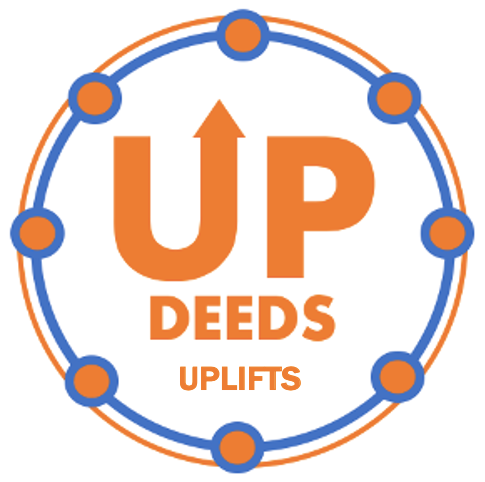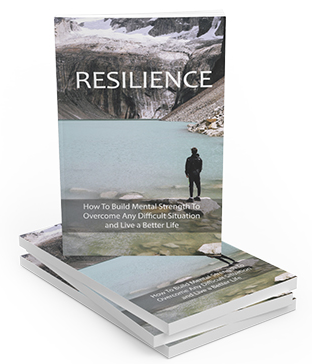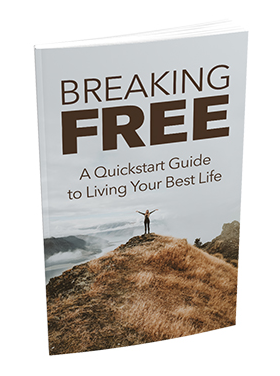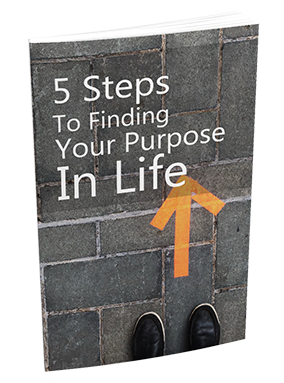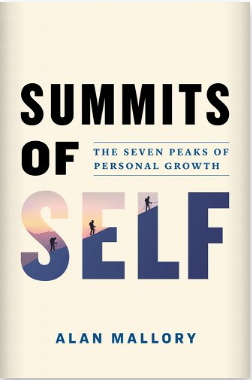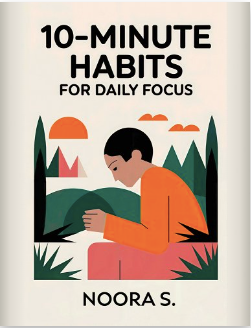5 WAYS TO A BETTER LIFE
Lifting up and helping others is what Up Deeds is about and why we began. Even our name reflects those values,
Uplifting others with Deeds. There are many ways that what makes nonprofits special are also what can make us special. This is a journey for all of us to live a life of value and mission orientated.
We offer these simple ways to begin your journey to a life well lived.

The purpose of 5 Ways to... is to find easy and not complex ways for all of us to lead our best lives. As is the Up Deeds way, we are offering FREE Ebooks to help you on your journey of growth.
5 Simple Ways to Embrace Life’s Challenges
By Up Deeds
Life can often throw unexpected difficulties our way. Whether it's personal struggles, job-related stress, or relationship issues, learning to accept and navigate these challenges is crucial for our well-being. Here are five simple ways to embrace life's difficulties and grow stronger.
1. Change Your Perspective
The first step in accepting life’s difficulties is to change how you see them. Instead of viewing challenges as burdens, try to see them as opportunities for growth. Every obstacle can teach you something valuable. Reflect on past experiences and recognize what you learned from them. A positive mindset can make it easier to cope with tough situations.
2. Practice Mindfulness
Mindfulness is a powerful tool for managing stress and anxiety. It involves being fully present in the moment and not letting your mind wander to worries about the future or regrets about the past. Take time each day to practice mindfulness through deep breathing, meditation, or simply enjoying nature. This practice can help you become more aware of your thoughts and feelings, making it easier to accept difficult emotions when they arise.
3. Seek Support from Others
You don’t have to face life’s challenges alone. Reach out to friends, family, or support groups for comfort and advice. Talking about your difficulties can provide relief and help you gain new perspectives. Others may have gone through similar struggles and can offer insights or simply lend an ear to listen. Building a support network can make a big difference in how you cope with life’s challenges.
4. Set Realistic Goals
When facing difficulties, setting small, achievable goals can help you regain a sense of control. Break down larger challenges into manageable steps. This approach can reduce feelings of overwhelm and give you a sense of accomplishment as you complete each goal. Celebrate these small victories, as they can motivate you to keep moving forward.
5. Focus on Self-Care
Taking care of yourself is vital when facing hardships. Ensure you’re getting enough sleep, eating healthily, and finding time for activities you enjoy. Engage in physical exercise, as it can boost your mood and reduce stress. Prioritizing self-care helps build resilience and equips you to better handle challenges.
Accepting life’s difficulties doesn’t mean you have to face them without support or strategy. By changing your perspective, practicing mindfulness, seeking support, setting goals, and focusing on self-care, you can navigate life’s challenges with grace and strength. Remember, facing difficulties can lead to personal growth and greater resilience.
5 Simple Daily Habits for a More Satisfying Life
By Up Deeds
Living a fulfilling life doesn’t require big changes. Instead, small everyday habits can make a huge difference. Here are five things you can do every day to lead a more satisfying life.
1. Start Your Day with Gratitude
Taking a moment each morning to reflect on what you’re grateful for can set a positive tone for your day. Whether it’s family, friends, or even just a warm cup of coffee, acknowledging the good in your life can boost your mood and encourage positivity. Consider writing down three things you're thankful for each morning; this practice can help shift your focus towards the positive aspects of your life.
2. Stay Active
Incorporating physical activity into your daily routine can greatly enhance your overall well-being. Whether it's a brisk walk, a quick workout, or some yoga, moving your body helps reduce stress and increases energy levels. Aim for at least 30 minutes of activity each day. This doesn’t have to be intense; even simple stretching or dancing to your favorite song counts!
3. Connect with Others
Social connections are vital for a satisfying life. Make it a habit to reach out to friends or family daily, whether through a call, text, or in-person meet-up. Sharing a laugh, discussing your day, or simply checking in can strengthen relationships and provide emotional support. Humans are social creatures, and maintaining these bonds greatly contributes to our happiness.
4. Take Time for Yourself
Amid the busyness of life, it's important to carve out time for yourself. This could be reading a book, practicing a hobby, or just enjoying some quiet time to reflect. Self-care is crucial, so choose activities that help you relax and re-energize. Even just 15-30 minutes dedicated to something you love can improve your mood and boost your satisfaction levels.
5. Practice Mindfulness
Being present in the moment can lead to greater contentment. Take a few moments each day to practice mindfulness through meditation, deep breathing, or simply observing your surroundings. This practice helps reduce anxiety and improves your overall perspective on life. Start with just five minutes a day, and you may find it transforms your outlook.
Incorporating these five simple habits into your daily routine can lead to a more satisfying life. Remember, it’s the small, consistent actions that can create lasting changes. Embrace each day with these practices, and watch as your life transforms for the better!
5 Simple Ways to Overcome Self-Doubt
By Up Deeds
Self-doubt can be a sneaky enemy that creeps into our minds, sapping our confidence and holding us back from reaching our potential. It’s a feeling we all experience at some point, but the good news is that there are effective ways to conquer it. Here are five practical strategies to help you overcome self-doubt and feel more empowered in your daily life.
1. Challenge Negative Thoughts
The first step to overcoming self-doubt is to challenge the negative thoughts that pop into your head. Instead of accepting these thoughts as facts, ask yourself if they’re really true. For example, if you think, “I’m not good enough to apply for that job,” counter it by recalling past successes or qualifications. Writing down your negative thoughts and reflecting on them can also help you see them for what they are—unfounded worries.
2. Set Small Goals
Tackling self-doubt can feel overwhelming, especially if you’re facing a big challenge. To make it manageable, set small, realistic goals that you can achieve step by step. This not only provides you with a clear roadmap but also gives you a sense of accomplishment as you check each goal off your list. Celebrate these small victories, as they build confidence and reinforce the notion that you are capable and competent.
3. Seek Support from Others
Surround yourself with supportive friends or family members who lift you up. Sharing your fears and insecurities can lighten the load and provide perspective. They may even offer encouragement or share their own experiences with self-doubt, showing you that you’re not alone. Sometimes, a little reassurance from an understanding person can be all you need to boost your confidence.
4. Practice Self-Compassion
Being kind to yourself is crucial when grappling with self-doubt. Instead of criticizing yourself for mistakes or perceived shortcomings, treat yourself with the same kindness you would offer a friend. Acknowledge that everyone struggles and that making mistakes is part of the learning process. By practicing self-compassion, you’ll reduce feelings of inadequacy and foster a healthier mindset.
5. Take Action Despite the Fear
Finally, one of the most powerful ways to combat self-doubt is to take action, even if you feel afraid. Start small, perhaps by speaking up in a meeting or trying something new. Each action you take will build momentum and confidence, proving to yourself that you are capable of facing challenges. Remember, courage isn’t the absence of fear; it’s the decision to move forward despite it.
By implementing these strategies, you can gradually conquer self-doubt and empower yourself to pursue your goals with confidence. Embrace the journey and watch your self-esteem soar!
5 Effective Ways to Overcome Your Fear of Failure
By Up Deeds
Fear of failure is a common struggle that can hold you back from reaching your goals and living your best life. Fortunately, you can take steps to conquer this fear and boost your confidence. Here are five practical ways to overcome your fear of failure and embrace success.
1. Change Your Mindset
The first step to overcoming fear is changing how you think about failure. Instead of seeing it as a negative outcome, view failure as a learning opportunity. Every successful person has faced setbacks. What matters is how you respond to them. Shift your perspective to see challenges as stepping stones to growth. Remind yourself that failures are often the best teachers.
2. Set Realistic Goals
Setting achievable goals can help reduce the fear of failure. When your goals are too ambitious, they can feel overwhelming and lead to a fear of not meeting expectations. Break your larger goals into smaller, manageable steps. This way, you can celebrate small achievements along the way, which will build your confidence and lessen the fear of failing at the bigger goal.
3. Prepare and Plan
Preparation is key to overcoming fear. When you take the time to plan and prepare, you feel more confident in your ability to handle challenges. Whether it’s preparing for a presentation or training for a sports event, doing your homework reduces anxiety. Create a solid plan that includes what to do if things don’t go as expected. The more prepared you are, the easier it will be to face potential setbacks.
4. Surround Yourself with Support
Having a strong support system can significantly help ease your fear of failure. Surround yourself with positive and encouraging people who believe in you. Share your goals and challenges with friends, family, or a mentor who can provide guidance and encouragement. Their support can help you feel less alone and more empowered to take risks without the fear of failing.
5. Take Action Despite Your Fear
Finally, the best way to conquer your fear of failure is to take action. This might seem daunting, but starting small can make it easier. Each small step you take towards your goal decreases your fear and builds your confidence. Embrace the possibility of failure, knowing that it is a part of the journey. The more you push through your fears and take action, the less power those fears will have over you.
Overcoming the fear of failure doesn’t happen overnight, but with these five strategies, you can build your resilience and confidence. Remember, every step you take brings you closer to success!
5 Ways Random Acts of Kindness Enhance Life Quality for You and Others
by Up Deeds
In a fast-paced world, where stress and negativity often dominate our daily lives, incorporating random acts of kindness can significantly enhance our well-being. These simple gestures not only uplift others but also improve our own quality of life. Here are five compelling reasons why practicing kindness is essential for both you and those around you.
Boosts Mental Health
Engaging in random acts of kindness leads to the release of endorphins, the brain's natural feel-good chemicals. Studies show that performing kind acts can lessen feelings of anxiety and depression. When you extend kindness, you're not just making someone else's day brighter; you're also elevating your own mood and sense of purpose. Feeling good from doing good is a powerful incentive to keep kindness flowing in our daily lives.
Strengthens Social Connections
Acts of kindness foster social bonds and community ties. Whether it’s helping a neighbor, volunteering, or simply offering a compliment, these interactions build a sense of belonging and trust. Feeling connected to others is paramount for emotional well-being. Stronger relationships lead to increased support networks, reducing feelings of isolation and loneliness, which fundamentally enhances life quality.
Creates a Ripple Effect
One of the most profound aspects of kindness is its contagious nature. When you perform an act of kindness, the recipient is likely to pay it forward, creating a ripple effect. This chain reaction fosters a culture of kindness within your community. As more individuals engage in kind acts, it contributes to a more positive and supportive atmosphere, benefiting everyone involved.
Improves Physical Health
Surprisingly, kindness can positively impact physical health as well. Research indicates that those who engage in altruistic behavior may experience lower blood pressure and improved heart health. The act of helping others can reduce stress levels, leading to a stronger immune system. By prioritizing kindness, you not only enhance your mental well-being but also your physical vitality.
Increases Life Satisfaction
Finally, practicing kindness can lead to greater life satisfaction and happiness. The sense of fulfillment that comes from seeing the joy you bring to others is unmatched. Moments spent uplifting friends, family, or strangers create lasting memories and a deeper appreciation for life. This heightened sense of gratitude can elevate your overall happiness and inspire more positivity in your life.
Random acts of kindness are vital for enhancing the quality of life for both you and others. By creating a cycle of positivity, you contribute to a brighter world, one act at a time. Embrace kindness and watch how it transforms your life!
5 Ways to Include Inclusivity into Your Daily Life
By Up Deeds
Inclusivity is essential for creating a sense of belonging and community. Here are five ways to incorporate inclusivity into your daily life:
1. Engage in Active Listening: Make a conscious effort to listen to others without interrupting. Whether in conversations with friends or colleagues, show genuine interest in diverse perspectives. This creates an environment where everyone feels valued and respected.
2. Educate Yourself: Take the initiative to learn about different cultures, lifestyles, and identities. Reading books, watching films, or attending workshops can broaden your understanding. This knowledge helps challenge biases and fosters empathy towards those who may have different experiences.
3. Support Diverse Voices: In your social and professional circles, highlight and uplift diverse voices. This could mean sharing content from underrepresented authors and creators or advocating for diversity in leadership positions. By promoting inclusive representation, you help create a more equitable space for all.
4. Practice Kindness and Respect: Simple acts of kindness can have a profound impact. Be polite to everyone, regardless of their background. Using inclusive language and avoiding assumptions can help in making others feel comfortable and included in conversations.
5. Participate in Community Initiatives: Join local organizations or groups focused on promoting inclusivity and social justice. Volunteering for initiatives that support marginalized communities can provide hands-on experience while fostering a sense of connection with diverse groups.
Incorporating these practices into your daily routine can significantly contribute to a more inclusive environment, encouraging understanding, compassion, and support for all individuals. Embracing inclusivity not only enriches your life but also the lives of those around you.
A few books you will enjoy. Click on the image, and search "inclusivity".
How and Why Kindness Matters
By Up Deeds
Kindness has a profound impact on both our lives and the lives of others, creating a ripple effect that extends beyond immediate actions. Here are five ways it can make a difference:
1. Enhances Relationships: Acts of kindness strengthen bonds between individuals. Simple gestures, like helping a friend or offering a compliment, can foster trust and deep connections, enriching our personal and social lives.
2. Boosts Mental Health: Being kind not only makes others feel good but also improves our own well-being. Engaging in altruistic acts releases endorphins, leading to increased happiness and reduced feelings of stress and anxiety.
3. Encourages Empathy: Practicing kindness helps us understand others’ experiences and perspectives. This increased empathy promotes a more compassionate and understanding community, making it easier to connect with those around us.
4. Creates a Positive Environment: Kindness is contagious. When we act kindly, it inspires others to do the same, creating a culture of positivity. This can lead to a supportive atmosphere in workplaces, schools, and neighborhoods.
5. Fosters Resilience: Acts of kindness can provide comfort during challenging times. Supporting others helps build a sense of community, giving us the strength to overcome hardships together. Ultimately, kindness cultivates a more fulfilling and interconnected life for everyone involved.
5 Ways to make the season brighter:
By Up Deeds
1. Connect with Friends and Family: Reach out to loved ones through phone calls, video chats, or messages. Scheduling regular catch-ups can help maintain those connections and make you feel less isolated.
2. Volunteer: Helping those in need can give you a sense of purpose and fulfillment. Look for local charities or community organizations that need help during the holiday season, whether it’s serving food, wrapping gifts, or organizing events.
3. Host or Join Gatherings: Consider hosting a small gathering or participating in community events. This could be a potluck dinner, holiday movie night, or a game night. Engaging with others can foster a sense of belonging.
4. Create New Traditions: Start your own holiday traditions, even if it’s just a cozy movie marathon, baking treats, or decorating your space. This can bring joy and create a positive atmosphere.
5. Engage in Hobbies: Dive into activities you enjoy or try something new, such as crafting, cooking, or reading. Focusing on your interests can be a great way to distract from loneliness and promote self-care.
Remember, reaching out and finding joy in small moments can significantly enhance your holiday experience.
Claim your FREE ebook, click on the image.
5 Ways life can be hard, and 5 Ways to make Life less hard
By Up Deeds
1. Financial Strain: Many people experience stress due to financial pressures, such as managing bills, debt, or unexpected expenses. The constant worry about money can dominate thoughts, leading to anxiety and diminished quality of life.
2. Work-Life Balance: Juggling professional responsibilities with personal life can be overwhelming. Long hours, demanding bosses, and the pressure to perform can lead to burnout, making it hard to maintain relationships and engage in self-care.
3. Health Issues: Dealing with chronic illness or health-related challenges can significantly impact daily life. Physical ailments often lead to emotional distress, creating a cycle of pain and discouragement that feels hard to break.
4. Loneliness: In a digitized world, feeling isolated can be common. Whether from relocation, busy schedules, or personal circumstances, loneliness can weigh heavily and make it harder to cope with life's challenges.
5. Uncertainties of Change: Life is full of unexpected twists and turns that can be difficult to navigate. Changes in job status, relationships, or living situations can create feelings of fear and instability, making it hard to find a secure footing.
Five Ways to Make Life Less Hard
1. Develop a Financial Plan: Creating a budget can empower you to manage finances more effectively. Tracking income and expenses helps prioritize needs, reduce overspending, and set realistic saving goals, alleviating some stress around money.
2. Cultivate Meaningful Connections: Nurturing relationships by fostering open communication can create a robust support system. Engaging in meaningful conversations and expressing thoughts and feelings openly can diminish feelings of loneliness and strengthen bonds.
3. Establish Personal Goals: Focusing on achievable goals can help redirect your energy positively. Break down larger goals into smaller, actionable steps, and celebrate progress to build confidence and motivation through realistic expectations.
4. Practice Self-Care Routinely: Emphasizing self-care by incorporating activities like regular exercise, healthy eating, and mindfulness practices can significantly enhance both physical and emotional well-being. Dedicating time to relax and recharge helps build resilience against life’s pressures.
5. Embrace Change with Openness: Adopting a flexible mindset can make navigating life’s uncertainties easier. Accepting change as part of life and viewing it as an opportunity for growth can help maintain a positive outlook, even when faced with challenges.
By recognizing the difficulties and actively implementing these strategies, life can feel more manageable and fulfilling.
5 Ways Increasing your Creativity can Benefit your Life
By Up Deeds
1. Problem-Solving Skills: Creative thinking enables you to approach problems from various angles. This flexibility allows for innovative solutions, whether in work projects or personal challenges, leading to more effective outcomes.
2. Enhanced Communication: Creativity fosters unique ways to express thoughts and ideas, making your communication more engaging. This can improve team collaboration and strengthen personal relationships, as others are more likely to connect with your imaginative insights.
3. Increased Adaptability: A creative mindset encourages openness to change. In professional environments, this adaptability helps you navigate shifting priorities and unexpected challenges, making you a valuable team member in dynamic settings.
4. Boosted Confidence: Engaging in creative activities can build self-esteem as you embrace your unique ideas and talents. This newfound confidence often translates into both your personal pursuits and professional endeavors, allowing you to take calculated risks.
5. Job Satisfaction and Fulfillment: Tapping into your creativity can make work more enjoyable and fulfilling. A stimulating environment where creativity is encouraged leads to greater job satisfaction, promoting overall well-being and productivity in your professional life.
Your FREE Ebook on creativity is waiting for you. Just click on the book.
5 Ways that Lifelong Learning Positively Impacts Your Life
By Up Deeds
1. Cognitive Engagement: Continuously acquiring new knowledge stimulates brain functions, enhancing memory, problem-solving skills, and overall cognitive health. This mental engagement can help delay or prevent cognitive decline associated with aging.
2. Stress Reduction: Engaging in learning activities can provide a productive outlet for stress. Hobbies and educational pursuits distract from daily pressures, promoting relaxation and reducing anxiety levels.
3. Social Connections: Learning often involves collaboration and interaction with others, which fosters social relationships. These connections can alleviate feelings of loneliness and isolation, contributing to better mental well-being.
4. Increased Self-Efficacy: Mastering new skills can bolster self-confidence and a sense of accomplishment. This boosts mental resilience, helping individuals cope better with challenges and setbacks in life.
5. Physical Activity: Many learning opportunities involve physical activities like dance classes, sports, or outdoor education. Engaging in these activities not only provides physical benefits but also releases endorphins, improving mood and overall mental health.
Overall, committing to lifelong learning nurtures a healthy mind and body, promoting a balanced and fulfilling life.
Finding a Personal Niche in Life:
By Up Deeds
1. Self-Reflection: Take time to assess your values, interests, and strengths. Journaling or meditative practices can help clarify what truly matters to you.
2. Explore Different Areas: Engage in various activities or fields to discover what resonates with you. This might involve taking classes, volunteering, or pursuing hobbies.
3. Seek Feedback: Ask friends, family, or mentors about what they see as your strengths and unique qualities. Sometimes others can see potential in us that we overlook.
4. Pursue Growth: Continually seek opportunities for personal development. This may include education, travel, or new experiences that broaden your perspective.
5. Align Actions with Values: Ensure your daily activities and career align with your core values. This alignment is crucial for a fulfilling life.
Finding a niche, whether in business or personal life, is a journey of exploration and self-discovery. By being intentional and reflective, you can create a path that feels authentic and
How Compassion for others can Benefit your own Well-being
By Up Deeds
1. Enhanced Emotional Well-being: Practicing compassion can lead to reduced feelings of stress and anxiety. When you focus on helping others, it can shift your perspective and lessen your own burdens, promoting a sense of happiness and fulfillment.
2. Stronger Relationships: Showing compassion fosters deeper connections with others. By being empathetic and caring, you build trust and strengthen your relationships, which can lead to a supportive network that enhances your social life.
3. Increased Resilience: Compassion can help you develop resilience. When you support others through their challenges, you may find that it prepares you to handle your own difficulties better, fostering a sense of strength and perseverance.
4. A Sense of Purpose: Helping others provides a sense of purpose and meaning in life. Engaging in acts of kindness can instill a feeling of accomplishment and fulfillment, motivating you to continue contributing positively to your community.
5. Personal Growth: Compassion encourages personal growth and self-reflection. It pushes you to be more understanding and open-minded, leading to greater empathy and awareness of the struggles others face, ultimately enriching your own character.
How Having Compassion for others Helps Other People
By Up Deeds
1. Emotional Support: Compassion provides emotional support to those in distress. When people feel understood and cared for, it can alleviate their suffering, helping them cope with challenges more effectively.
2. Fostering Connection: Acts of compassion create a sense of community and belonging. When people show kindness, it strengthens relationships and builds trust, making individuals feel valued and included.
3. Encouragement: Compassion inspires and motivates others. When someone exhibits empathy and understanding, it encourages those around them to adopt a similar mindset, promoting a positive environment where everyone feels empowered to help one another.
4. Promoting Healing: Compassionate actions can aid in healing, both emotionally and physically. Simple gestures of kindness can reduce stress and anxiety, leading to improved mental health and well-being, allowing individuals to recover more swiftly from difficulties.
5. Encouraging Change: Compassion can spark social change. By demonstrating care for others and advocating for their needs, individuals can raise awareness about societal issues, encouraging others to engage in actions that promote justice and equality, ultimately benefiting the broader community.
5 ways helping nonprofits can contribute to personal growth.
By Up Deeds
Helping nonprofits can significantly contribute to personal growth and character development in various ways:
1. Empathy Development: Engaging with diverse communities exposes you to different backgrounds and challenges, fostering a deeper understanding and compassion for others. This heightened empathy can transform how you interact with those around you.
2. Skill Enhancement: Volunteering often requires you to step out of your comfort zone and develop new skills, whether in leadership, communication, or problem-solving. These competencies not only benefit the organization but also enrich your personal and professional life.
3. Sense of Purpose: Working towards meaningful causes provides a sense of fulfillment and purpose. Discovering your passions through nonprofit work can guide you in making more informed choices about your life's direction.
4. Community Building: Helping nonprofits connects you with like-minded individuals who share your values and interests. These relationships can lead to lifelong friendships and a strong support network, enhancing your sense of belonging.
5. Perspective Shift: Contributing to social causes can broaden your perspective on life. It encourages gratitude for your circumstances and inspires a commitment to making positive changes, not only in the community but also within yourself.
Through these experiences, you become more aware, compassionate, and engaged, ultimately shaping you into a better person.
We all have mountains to climb. Some we climb by choice; others rise before us without warning.
All require skill, preparation, and determination to conquer.
5 Ways to find more time in your day
By Up Deeds
1. Prioritize Tasks: Start each day by identifying your most important tasks. Use a to-do list or a prioritization matrix to focus on what truly matters, helping you allocate time effectively.
2. Eliminate Distractions: Identify activities that waste your time, such as excessive social media use or unproductive meetings. Set boundaries, limit notifications, and create a focused workspace to enhance productivity.
3. Utilize Time Blocks: Schedule specific blocks of time for different activities. This method encourages focused work sessions and helps you manage your day more efficiently, reducing the temptation to multitask.
4. Delegate Responsibilities: Assess your workload and delegate tasks to others when possible, whether at work or home. Sharing responsibilities can free up significant time for you to focus on high-priority projects.
5. Review and Adjust: Regularly review how you spend your time. Identify time sinks and adjust your schedule to minimize them, ensuring that you are making the most of your available hours.
10-Minute Habits for Daily Focus: Simple, Time-Saving Techniques to
Improve Focus, Boost Productivity, and Create Lasting
Positive Habits in Just 10 Minutes.
5 Ways to save $100.00 per year for donations
by Up Deeds
1. Cut Down on Subscriptions: Review your monthly subscriptions (like streaming services or magazines) and cancel any you don’t use regularly. Saving even $8 a month can add up to $96 a year.
2. Pack Your Lunch: Instead of buying lunch daily, prepare meals at home. If you spend $5 on lunch each day, packing your meals can save you around $100 over a month.
3. Reduce Coffee Shop Visits: If you buy coffee frequently, cutting back to one homemade coffee a day can save you $100 a year. Make coffee at home instead.
4. Limit Impulse Purchases: Set a monthly budget for discretionary spending and stick to it. Use a 24-hour rule on non-essential items to cut down on unnecessary expenses.
5. Utilize Coupons and Discounts: Take advantage of coupons, cashback apps, or shopping sales for your regular purchases. Even small savings can accumulate to boost your charity contributions over the year.
By implementing these strategies, you can easily save an additional $100 for donations to your favorite charity! Just imagine if you used all 5 of these.
5 Ways to lead a safer life
by Up Deeds
1. Stay Aware of Your Surroundings: Always pay attention to your environment, whether you’re walking alone, driving, or in public spaces. This awareness can help you identify potential hazards or suspicious behavior.
2. Practice Cybersecurity: Protect your personal information online by using strong, unique passwords for each account, enabling two-factor authentication, and being cautious about sharing information on social media.
3. Keep Emergency Contacts Handy: Have a list of emergency contacts accessible, including family members, close friends, and local emergency services. Store these contacts on your phone and in a physical location.
4. Learn Basic First Aid: Taking a first aid course can empower you to respond effectively in emergencies, whether providing assistance in accidents or dealing with medical situations until help arrives.
5. Secure Your Home: Invest in good locks, an alarm system, and outdoor lighting to enhance your home's security. Regularly check for vulnerabilities and consider joining a neighborhood watch program to foster community safety.
These are all simple, practical lessons we can all practice to have a safer life.
The Power and Benefits of Actively Listening to Others
By Up Deeds
Active listening is very important in our daily lives. When we listen carefully to someone, it shows that we value their thoughts and feelings. This helps build trust and strengthens our relationships. For the person speaking, knowing they are heard makes them feel respected and understood.
When we actively listen, we pay attention not just to words but also to body language and emotions. This helps us understand the speaker's message better. By doing so, we can offer the right support or response, making conversations more meaningful.
Active listening also helps reduce misunderstandings. When we focus on what someone is saying, we are less likely to jump to conclusions or make mistakes. This leads to clearer communication and fewer conflicts.
For ourselves, active listening improves our empathy skills, allowing us to connect with others on a deeper level. Overall, it creates a positive environment where everyone feels valued, leading to healthier interactions and a stronger community.
5 Ways to Break a Bad Habit
By Up Deeds
1. Identify Triggers: Recognize the situations, emotions, or environments that lead to your bad habit. Keeping a journal can help you track when and where the habit occurs, making it easier to understand its triggers.
2. Set Clear Goals: Define specific, attainable goals for breaking the habit. Instead of saying "I want to stop smoking," aim for "I will reduce my smoking from 10 to 5 cigarettes a day over the next month."
3. Replace the Habit: Find a healthier alternative to substitute the bad habit. For instance, if you're trying to cut out snacking on junk food, replace it with fruits or nuts instead.
4. Seek Support: Share your goal with friends, family, or a support group. Their encouragement and accountability can motivate you to stay on track and provide a network for sharing struggles and successes.
5. Practice Mindfulness: Engage in mindfulness techniques like meditation or deep breathing exercises. This can help you become more aware of your habits, manage your impulses, and reduce stress, making it easier to resist the urge to fall back into the old behavior.
5 Ways to Earn an extra $100.00 a month
By Up Deeds
1. Freelancing: Utilize your skills such as writing, graphic design, or web development on platforms like Upwork or Fiverr. Even a few small projects can help you reach your $100 goal.
2. Online Tutoring: If you're knowledgeable in a particular subject, consider tutoring students online. Websites like VIPKid or Chegg Tutors offer flexible hours and decent pay.
3. Sell Handmade or Vintage Items: Use platforms like Etsy or eBay to sell crafts, vintage clothing, or collectibles. You can start small and gradually increase your inventory.
4. Online Surveys and Market Research: Join websites that pay for your opinion, such as Survey Junkie or Swagbucks. While they won’t make you rich, consistently participating can add up over time.
5. Pet Sitting or Dog Walking: Offer your services on platforms like Rover or Wag! to pet owners in your area. This can be a fun way to earn extra cash while enjoying the company of animals.
By choosing one or more of these avenues, you can comfortably make an extra $100 each month from home.
5 Ways to Increase Your Gratitude for Life
By Up Deeds
1. Daily Journaling: Set aside a few minutes each day to write down things you’re grateful for. This practice helps you focus on the positives in your life and reinforces a mindset of appreciation.
2. Mindfulness Meditation: Practicing mindfulness allows you to stay present and fully appreciate each moment. By paying attention to your thoughts and feelings, you can cultivate a deeper sense of gratitude for the here and now.
3. Express Thanks: Make a habit of thanking others, whether it's a simple “thank you” to a stranger or a heartfelt note to a friend or family member. This not only boosts your mood but also strengthens your connections with others.
4. Volunteer: Helping those in need can give you perspective on your own life. Engaging in acts of service fosters empathy and highlights the blessings you often take for granted.
5. Nature Appreciation: Spend time in nature and take a moment to admire its beauty. Whether it's a walk in the park or a hike, connecting with the natural world can remind you of the wonders of life, enhancing your gratitude.
5 Ways to Build Your Confidence
By Up Deeds
1. Set Small Goals: Start by setting achievable, short-term goals. Accomplishing these tasks boosts your self-esteem and provides a sense of progress.
2. Practice Positive Self-Talk: Replace negative thoughts with positive affirmations. Encouraging yourself and acknowledging your strengths can significantly improve your self-image.
3. Step Out of Your Comfort Zone: Challenge yourself by trying new activities or facing fears. Each small success will help expand your comfort zone and build confidence.
4. Learn and Improve: Invest time in developing your skills. Whether through courses or workshops, gaining knowledge in areas of interest can enhance your confidence in your abilities.
5. Surround Yourself with Supportive People: Build a network of friends and mentors who uplift and encourage you. Their positive reinforcement can help foster your self-belief and motivate you to take on new challenges.
5 Ways to Lead a Better Life
By Up Deeds
1. Practice Gratitude: Take a moment each day to reflect on what you’re thankful for. This simple act can shift your mindset and improve your overall outlook on life.
2. Stay Active: Incorporate physical activity into your routine. Regular exercise boosts your mood, enhances your health, and provides a sense of accomplishment.
3. Cultivate Relationships: Invest time in building and maintaining strong connections with friends and family. Positive relationships can provide support, joy, and a sense of belonging.
4. Embrace Learning: Continuously seek opportunities to learn new skills or explore new interests. This not only keeps your mind engaged but also fosters personal growth and fulfillment.
5. Practice Mindfulness: Engage in mindfulness or meditation to stay present and reduce stress. Being mindful helps you appreciate everyday moments and enhances your emotional well-being.
By incorporating these practices into your life, you can create a more fulfilling and enriched existence.
By incorporating these strategies into your daily routine, you'll gradually build the confidence you need to tackle life's challenges with a more empowered mindset.
5 Ways Ways to Improve your Conversation Skills
By Up Deeds
1. Active Listening: Focus on what the other person is saying without planning your response while they talk. Show genuine interest by nodding or using affirmations, which encourages them to share more.
2. Ask Open-Ended Questions: Instead of yes/no questions, ask questions that require more elaborate answers. This invites deeper discussions and helps keep the conversation flowing naturally.
3. Practice Empathy: Try to understand the speaker’s emotions and perspectives. Acknowledging their feelings can create a stronger connection and foster a more meaningful dialogue.
4. Be Mindful of Non-Verbal Cues: Pay attention to body language, tone, and facial expressions. These non-verbal signals can enhance communication and show that you are engaged and attentive.
5. Stay Informed: Keep up with current events and varied topics. Having a broad knowledge base allows you to engage in diverse conversations and connect with others over shared interests.
By applying these techniques, you can enhance your conversation skills and build more meaningful interactions with those around you.
MORE TO COME
